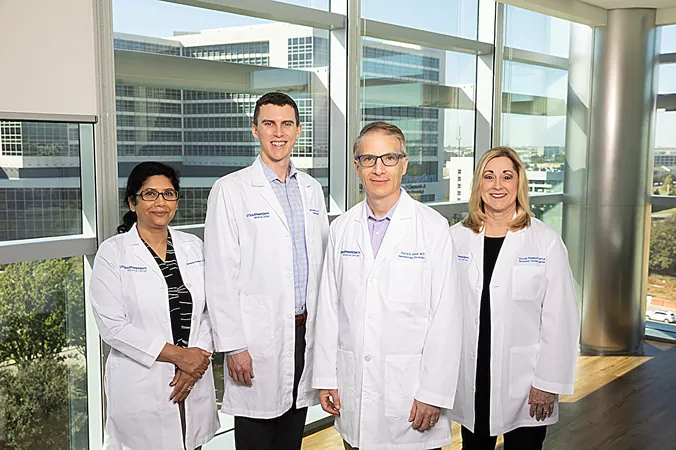
Revolutionary Drug Showcases Hope in Battle Against Non-Small Cell Lung Cancer
2024-12-09
Author: Daniel
Breakthrough Discoveries in Lung Cancer Treatment
In an exciting breakthrough, researchers from the UT Southwestern Harold C. Simmons Comprehensive Cancer Center have unveiled promising results from a clinical trial testing an FDA-approved drug originally designed for treating multiple myeloma and lymphoma. The drug, selinexor, has shown remarkable efficacy in shrinking tumors in patients with non-small cell lung cancer (NSCLC) carrying KRAS mutations.
Significance of the Study
The study, published in *Clinical Cancer Research*, heralds a potential new avenue for treatment in a significant population of lung cancer patients. Dr. David E. Gerber, a leading figure in the study and a professor at UT Southwestern, emphasized the significance of these findings, stating, "This novel treatment appears promising for one of the most common and difficult-to-treat forms of lung cancer."
Lung Cancer Statistics
In the United States alone, more than 234,000 patients are expected to receive a lung cancer diagnosis this year, with 85% classified as NSCLC. Alarmingly, about 25% of NSCLC patients harbor KRAS mutations, which are notoriously difficult to target. For years, these mutations have been linked to several cancer types, including colorectal, pancreatic cancers, and leukemias, yet appropriate therapies have been limited. The recent approvals of sotorasib and adagrasib have offered some hope but are effective in only a small percentage of patients with specific KRAS mutations, leaving many without effective treatment options.
Study Methodology
The study took shape after preclinical models indicated that selinexor, a nuclear export inhibitor, could effectively kill cancer cells with KRAS mutations. To explore this promising lead in humans, researchers recruited 40 NSCLC patients who had undergone various treatments, including chemotherapy and immunotherapy, with little success. The trial participants began a weekly regimen of selinexor, followed by docetaxel, a standard chemotherapy agent for NSCLC.
Results and Side Effects
While side effects such as nausea and fatigue were prevalent, the results were striking: nearly 80% of the patients experienced cancer control, a significant improvement from what would typically be expected from docetaxel alone. Notably, selinexor demonstrated effectiveness across various KRAS mutation types, although tumors with inactivating mutations in the TP53 gene were less responsive.
Future Research Directions
What’s more, preliminary findings suggest that selinexor exhibited anti-tumor activity independently before administering docetaxel, prompting researchers to explore this avenue in future trials. "Effective treatments for KRAS mutant lung cancer remain a major unmet clinical need," Dr. von Itzstein stated, highlighting the urgency for innovative therapies in this area.
Conclusion
As research continues to unfold, this repurposed medication could potentially revolutionize the treatment landscape for a significant number of lung cancer patients facing the deadly consequences of KRAS mutations. Stay tuned as scientists press forward in the quest for cancer cures!



 Brasil (PT)
Brasil (PT)
 Canada (EN)
Canada (EN)
 Chile (ES)
Chile (ES)
 España (ES)
España (ES)
 France (FR)
France (FR)
 Hong Kong (EN)
Hong Kong (EN)
 Italia (IT)
Italia (IT)
 日本 (JA)
日本 (JA)
 Magyarország (HU)
Magyarország (HU)
 Norge (NO)
Norge (NO)
 Polska (PL)
Polska (PL)
 Schweiz (DE)
Schweiz (DE)
 Singapore (EN)
Singapore (EN)
 Sverige (SV)
Sverige (SV)
 Suomi (FI)
Suomi (FI)
 Türkiye (TR)
Türkiye (TR)